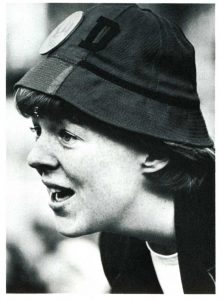“We weren’t speaking to the world. We were speaking to one another. The kind of collectivity that emerged at Douglass – a thriving lesbian community that gave a tremendous amount of cultural vitality and social vitality to the women who were part of it, but also to the world that it went out into. We did remarkable things.” – Kay Turner

A reunion of sorts was held on October 25, 2018 for the “dink dykes” of Douglass College (DC). In “Dink Dykes: Lesbian Culture at Douglass College, 1967-1977,” Kay Turner (DC Class of 1971) facilitated a roundtable discussion with Douglass graduates to reflect on the lesbian culture that emerged at and around the women’s college in the 1960s and 1970s. The panelists were Adria Evans (DC ’71), Barbara Lee (DC ’72), Gail Walker (DC ’73), Paula Schorr (DC ’74), Joanne Fuccello (DC ’75), and Rue Watson (DC ’77). Their former classmates at Douglass College, faculty and staff members, and current Rutgers students made up the audience.
Kay posed questions to Adria, Barbara, and Paula about their experiences at Douglass and Joanne, Gail, and Rue responded to these stories. The topics Kay presented to the women on the panel were cultural creativity driven by lesbians on-campus and off, Douglass campus politics, sex and love, faculty and staff allies, connections to evolving gay culture and political activism, local businesses, and post-college social bonding. The discussion began with discussions of each woman’s unique coming out process and the role the Douglass College played in understanding their sexuality. Barbara described her early moments at Douglass as “this time of change that everyone was going through” and many of the other women shared this sentiment.
Speakers invited to campus seemed particularly important to the lesbian culture of Douglass College in the 1960s and 1970s. Joanne described the importance of Adrienne Rich on staff at Douglass College. Visits to campus by Rita Mae Brown and Anne Sexton were particularly important to Ruth’s time at Douglass. Kay remembered a talk with Margaret Mead. Carol Sanchez was the woman behind many of these influential events. Ruth described Carol Sanchez as “the patron saint of Douglass lesbians.” Carol directed the Voorhees Assembly Board and worked with Douglass students to bring in many of the speakers and artists the women described as important to their own development and the lesbian culture of Douglass College. Gail stressed not only the importance of bonds with each other as lesbians at Douglass College, but also supportive relationships with faculty and staff. Geoffrey Hendricks from the Art Department and Gordon Clanton, Christine Downing, and William Doty from the Religion Department were named as especially supportive faculty members. Janet Yocum and Joan Hayward, in attendance at the event, were also highlighted as important Douglass administrators who supported the panelists during this time. Janet described the dissonance faced by herself and other administrators who wanted to support and accept the lesbians of Douglass College but did not want outside students to think Douglass was a “lesbian school.” “The lesbian community contributed way more to the college than the population at large” according to Joan and this declaration was met with a round of applause.
Music and the arts scene at Douglass College played an important role in the lives of the women during their time at the college. Paula discussed the importance of the New Haven Women’s Rock Band, where she saw a same sex couple kissing publicly for the first time, and Lavender Jane Loves Women. A show for the latter group was particularly important when a male attendee disrupted the performance and in response Kay shouted, “I’m a lesbian.” Paula and Kay both saw this as a turning point where the gay women of Douglass began to use and embrace the term on campus. Barbara discussed the founding of their own all-lesbian band, Slip of the Tongue, at Douglass College and their first performance outside of Gramercy Books on Church Street in New Brunswick. Paula described the bands, the Oral Tradition and the Lesbosonic Funk Force, and the power she felt when singing openly about gay love with the band. Many of the women contributed to Watermark, the Douglass literary magazine, and Kay’s journal Lady Unique: Inclination of the Night. The labor that the women put into writing, publishing, and distributing Lady Unique was an important bonding activity remembered by both panelists and some audience members.
The “Dink Dykes” discussion ended with audience members discussing the impact of the panelists and the lesbian culture that emerged and flourished between 1967 and 1977.
A full recording of the event can be viewed here.
An accompanying digital photo album for this blog post and the panel discussion can be found here.
Please contact Rutgers University Libraries if you would like to discuss donating materials related to lesbian culture at Douglass College.
This post was written by Dan Delmonaco, Graduate Specialist with the Margery Somers Foster Center.